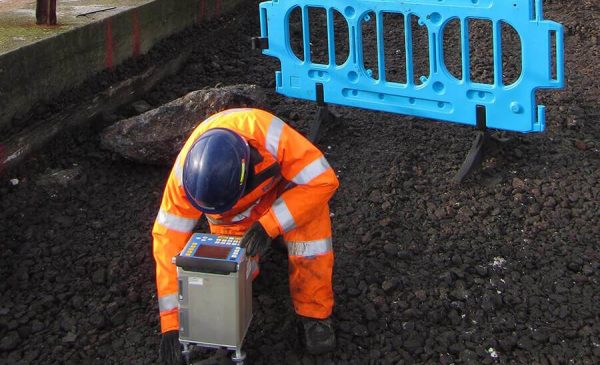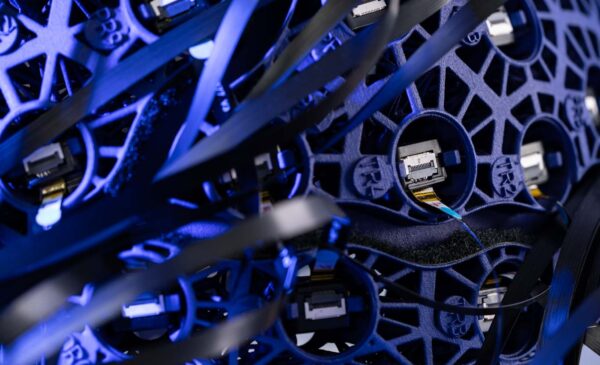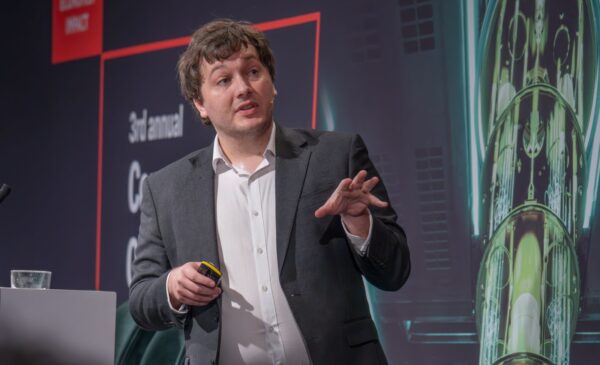A UK consortium of leading scientific and engineering companies have come together to develop a new industry of quantum cold-atom sensors that will detect and monitor objects beneath the ground better than any current technology, thereby reducing the need for investigative drilling or digging. The Gravity Pioneer project, which has been awarded £6 million in research funding from UK Research and Innovation, was announced today (9 November) at the 2018 National Quantum Technologies Showcase in London.
The Gravity Pioneer project will be led by leading environmental and engineering services company RSK and consist of 12 project partners from prominent organisations currently engaged in quantum technologies in the UK: Teledyne e2v, Fraunhofer UK, Altran, Geomatrix Earth Science, Magnetic Shields, UniKLasers, Silicon Microgravity, Optocap, QinetiQ, the University of Birmingham and the University of Southampton. The project aims to build and test a new gravity instrument that will have demonstrable benefits over existing technologies on the market.
The University of Birmingham – academic lead for the project and for the Quantum Technology Hub for Sensors and Metrology – will build on strong collaborations between its School of Physics and Astronomy and the Department of Civil Engineering to provide expertise in the development and use of quantum technology based gravity gradient sensors for practical applications. Principle Investigator Dr Michael Holynski, lead of the Atom Interferometry team at Birmingham and scientific lead of the project, with Co-Investigators Prof Nicole Metje, Head of the Power and Infrastructure Group, Prof Kai Bongs, Director of the Quantum Technology hub, Dr Jamie Vovrosh, Dr Dan Boddice and the team will work closely with the project partners to deliver step changes in our ability to detect objects beneath the ground.
“Despite our increasing ability to detect and monitor objects that exist on land, in the sea, around buildings or in space, our ability to detect objects beneath the ground has not improved significantly,” explains George Tuckwell, project lead and divisional director for geosciences and engineering at RSK. “When it comes to attempting to locate a forgotten mineshaft, determine the extent of a sinkhole or assess the quality of infrastructure, we still often resort to digging or drilling holes. This presents huge economic and societal costs as road networks are dug up, oil wells are dry or brownfield land is left undeveloped.”
Existing techniques for ground investigation include classical microgravity, ground penetrating radar and seismic technologies, but these can be limited in sensitivity, penetration or cost. Gravity Pioneer aims to develop a tested blueprint for a commercially relevant device that will overcome these challenges. Working with leading UK universities, it aims to demonstrate a 2× sensitivity improvement and a 10× measurement speed improvement over the industry standard gravity sensor.
The large project has received £6 million in research funding from UK Research and Innovation, the national funding agency investing in science and research in the UK. The consortium submitted a bid in response to the £20 million Quantum Technologies Pioneer Fund, which aims to develop prototypes in two years that could be used in future sensors, consumer electronics and digital services. The fund, which is part of the Industrial Strategy Challenge Fund, implements the policies set out in the UK government’s white paper Industrial Strategy: Building a Britain Future for the Future, which was published in 2017.
Speaking on receiving the research funding, Dr Richard Murray, business development manager at Teledyne e2v said, “The project was proposed by a UK consortium of the best scientific and engineering companies the UK has to offer, from component manufacturers to instrument developers and end-users. A large factor in the bid’s success was the prominent role of end-users in the project structure and the full supply chain of service, instrument and component partners involved. Together, we are working to build a gravity instrument that works, that the marketplace wants and that provides value to users such as RSK and client organisations such as BP, Network Rail, HS2 and Airbus.
“The UK is world leading in quantum technology and the project brings together the best the UK has to offer in this field. Once we can demonstrate the advanced performance of quantum cold-atom sensors, the economic and societal benefits of this new quantum industry in the UK will be significant.”
Notes for editors
For more information, please contact
Name Manjeet K Sambi
Job title Communications Officer
Address University of Birmingham, Edgbaston, B15 2TT
Direct dial: 0121 414 4269
Email: [email protected]
RSK
RSK is a fully integrated, environmental, health, safety and engineering services company employing over 2500 staff in offices across the UK and worldwide. In 2016, RSK was awarded the prestigious Queen’s Award for Enterprise in international trade, one of the UK’s highest accolades for business success. With a turnover of over £175 million, the company was ranked the eighth largest UK environmental consultancy by Environment Analyst in its 2017 Market Assessment Report.
RSK provides independent environmental consultancy and technical services in the areas of the environment, health and safety, engineering and sustainability management to industrial, financial and public-sector clients in the UK and abroad.
RSK has a diverse client base but mainly services key accounts for clients in energy, property, manufacturing, water, government and transport.
The company is certified to the ISO 9001, ISO 14001 and OHSAS 18001 international standards for quality, environmental management and health and safety management.
About Teledyne e2v’s quantum technologies group
The engineering groups of Teledyne can draw on a remarkable portfolio of leading-edge technology, unique expertise and decades of experience in sensing, signal generation and processing across a vast range of applications and industries. As a result, Teledyne e2v is well positioned to focus on the development and commercialisation of quantum technologies.
Teledyne e2v’s quantum technologies team aims to harness quantum effects to produce devices that have exciting new applications in the real world. Quantum technologies are set to provide much-improved capabilities in timing, sensing and measurement, electronics, imaging, computing and simulation, and communications. Teledyne e2v’s Quantum team design solutions for the impossible.
Teledyne e2v is at the forefront of UK and European activities to industrialise these devices and unlocking a multitude of applications. Over the last four years, Teledyne e2v has grown a team of 30 highly skilled and talented scientists and engineers who are turning quantum science into the enabling technologies of the future. These products include super-accurate clocks and frequency references, quantum gravity sensors and quantum systems in space.
UK Research and Innovation
UK Research and Innovation is a new body which works in partnership with universities, research organisations, businesses, charities, and government to create the best possible environment for research and innovation to flourish. It aims to maximise the contribution of each of its component parts, working individually and collectively. It works with many partners to benefit everyone through knowledge, talent and ideas.
Operating across the whole of the UK with a combined budget of more than £6 billion, UK Research and Innovation brings together the seven Research Councils, Innovate UK and a new organisation, Research England.
UoB: https://www.birmingham.ac.uk/schools/physics/news/2018/quantum-gravity-pioneer-project.aspx
Teledyne e2v: https://www.teledyne-e2v.com/news/teledyne-e2v-wins-grants-to-lead-national-effort-to-commercialise-quantum-technologies/




